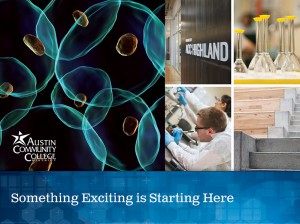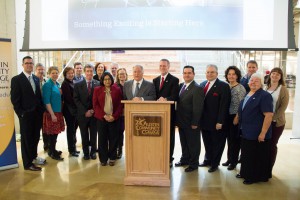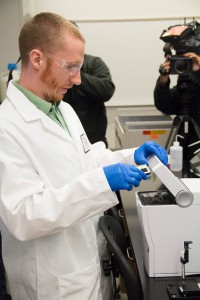 The state of Texas has awarded Austin Community College $4.9 million to develop a highly specialized biotechnology research lab known as a wet lab to address a critical shortage of research space in the region.
The state of Texas has awarded Austin Community College $4.9 million to develop a highly specialized biotechnology research lab known as a wet lab to address a critical shortage of research space in the region.
As the first community college in the state to build a wet lab, ACC will serve as a resource for Central Texas’ growing biomedical industry:
- Allowing ACC faculty and students to work in state-of-the-art facilities
- Providing incubation and contract services for industry partners to test new products
- Helping grow a skilled workforce for the region
“This is an exciting opportunity for our students and our community partners,” says Dr. Richard Rhodes, ACC president/CEO. “ACC has a long history of providing Central Texas industries the workforce and tools they need to prosper. This lab will take that commitment to a new level.”
The college is the first two-year institution to apply for and receive funding from the Texas Emerging Technology Fund (TETF) Research Award Matching program.
ACC is working in partnership with the Texas Life-Sciences Collaboration Center, the Austin Technology Incubator at the University of Texas, and the city of Georgetown.
“Our goal in Central Texas is to integrate medical education, healthcare, innovation, and research for the 21st century,” says state Sen. Kirk Watson of Austin. “Consistent with our 10 Goals in 10 Years, this grant moves us forward. I’m proud of the progress this community has made to transform biotechnology, medicine, and education in our region, and I’m glad that ACC continues to be a critical partner in this work.”
 With its partners, ACC will accelerate biotechnology manufacturing processes and time-to-market, resulting in the retention, recruitment, and expansion of life science and biotechnology early-stage companies in Central Texas. Companies developing products such as pharmaceutical drugs and medical devices will lease space in the 8,400-square-foot lab, which will adhere to cGMP (current Good Manufacturing Practices).
With its partners, ACC will accelerate biotechnology manufacturing processes and time-to-market, resulting in the retention, recruitment, and expansion of life science and biotechnology early-stage companies in Central Texas. Companies developing products such as pharmaceutical drugs and medical devices will lease space in the 8,400-square-foot lab, which will adhere to cGMP (current Good Manufacturing Practices).
Students in ACC’s Biotechnology Program will have the opportunity to work alongside professional researchers through internships, ultimately growing the number of skilled biological technicians and supporting continued industry expansion.
“Right now, many biotech startups are forced to turn elsewhere because Austin doesn’t have the facilities they need,” says Tom Kowalski, Texas Healthcare & Bioscience Institute president. “Research has shown that if we meet those needs, we can bring more than 1,000 new jobs to the area and make an economic impact of up to $110 million a year.”
Back to Top

